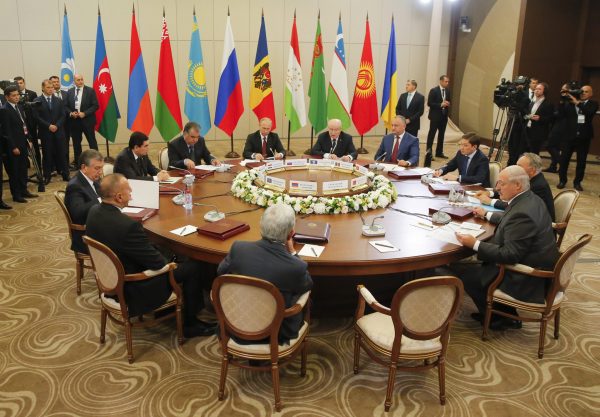Uzbekistan’s President Shavkat Mirziyoyev — who took over following the death of dictator Islam Karimov in August 2016 — has been the driving force behind this renewed push for cooperation, steering his country away from its previously isolationist path. In September 2017, he announced at the UN General Assembly the dawn of a ‘new political atmosphere’ in the region, based on ‘good-neighbourliness’. He has visited Kazakhstan four times, Turkmenistan three times and Kyrgyzstan and Tajikistan once in the past year alone.
Uzbekistan has also played host to a number of regional summits. The city of Samarkand hosted a UN conference on regional issues in November 2017. And the capital city Tashkent hosted a regional conference on Afghanistan in late March, further indicating the country’s desire to become a leading power broker and facilitator of regional cooperation.
Immediately after the collapse of the Soviet Union, regional trade between the Central Asian states constituted 20 per cent of their total turnover. But tensions between the states gradually rose. Uzbekistan and Tajikistan accused each other of harbouring terrorists. Kazakhstan began to look to partners beyond the region as it developed its hydrocarbon and mineral wealth, branding itself as ‘European’ rather than Central Asian. Turkmenistan adopted a policy of ‘permanent neutrality’, eschewing links with regional organisations.
Located at the region’s historic cultural and bureaucratic centre, Uzbekistan is the most populous state in Central Asia and commands the largest army. It was viewed by many as the potential regional hegemon following the collapse of the Soviet Union. But it never emerged as the leading state in the region, partly due to steps taken by Karimov that irked his neighbours. Uzbekistan mined its borders in 1999, introduced a visa regime for Tajik citizens in 2001, withdrew from the common electricity grid in 2009 and blockaded railway traffic entering Tajikistan from 2009. By 2012, regional trade had fallen to under 5 per cent.
The Central Asian states preferred to cooperate through larger regional organisations like the Commonwealth of Independent States, Eurasian Economic Union and Shanghai Cooperation Organisation, linking them to external patrons such as China and Russia. Roy Allison argues that membership of these organisations is a form of ‘protective integration’, allowing the region’s authoritarian regimes to insulate themselves against outside attempts to promote democracy and good governance.
With the death of Karimov, Uzbekistan is re-emerging as a pivot state in the region. Mirziyoyev’s government has ‘reset’ its relationships with the other Central Asian states, improving political relations and boosting economic ties. In March 2018, Mirziyoyev became the first Uzbek president to visit Tajikistan since 2000, signing an agreement to reopen 10 border posts closed since 2001. In December 2017, Uzbekistan and Kyrgyzstan agreed to demarcate 85 per cent of their border, ending a 26-year dispute.
Businesses and governments are already reaping the rewards of the revitalisation of connectivity. Trade between Tajikistan and Uzbekistan has increased from US$70 million in 2016 to US$240 million in 2017. Bilateral trade with Kazakhstan has risen by 35 per cent since 2016 and trade with Kyrgyzstan is up by 60 per cent. Trade fairs sponsored by the government of Uzbekistan have generated billions of dollars of investment deals.
Boosting transnational ties has helped reunite families, create new links between entrepreneurs and stimulate economic growth. But it is unlikely to bring a transformation to the region’s authoritarian states. Opening up Uzbekistan for investment and building closer ties with other Central Asian states alone does not translate into political liberalisation.
Mirziyoyev’s drive to reignite regional integration is more likely to be motivated by self-interest than an altruistic agenda to improve the lives of all Central Asians. Not only does Uzbekistan see an opportunity to make up for the lost opportunities under Karimov and re-emerge as the leading state in the region, but it also hopes to play host to peace talks on Afghanistan and the next Central Asian leader conference in 2019.
Boosting trade and investment is also driven by a desire to modernise Uzbekistan’s long-isolated authoritarian state. Following Kazakhstan and China’s lead, Uzbekistan is opening up its economy to outside investment, aiming to raise living standards and bolster the regime’s legitimacy without the need to decentralise political power.
Given the patronage-based political system, where elites dominate the economy through their links to the state, regional cooperation and increased investment promise to increase the revenue flowing into the private bank accounts controlled by the elite. Ultimately, it will be Mirziyoyev and those close to him that will benefit most from this new economic ‘openness’ and regional cooperation.
Edward Lemon is a postdoctoral research scholar at the Harriman Institute, Columbia University.

